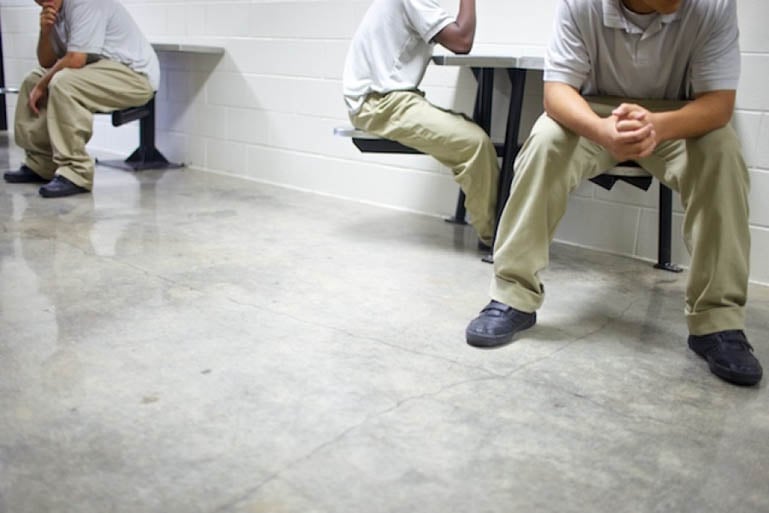
Guards Joined in Fights at Specialized Juvenile Lockup

Above: Youth in the Texas Juvenile Justice Department's Phoenix Program, photographed in September 2012.
It’s been a little over a year since we reported on the Phoenix Program, Texas’ latest experiment in getting its troubled juvenile lockups under control. The program promised intensive counseling and extra staff attention for the most violent and troubled kids in state lockups, while also removing them from the general population.
Phoenix was a sort of pilot program, an extreme measure meant to curb a troubling spike in violence within Texas’ juvenile lockups. So how’s it going?
As the Austin American-Statesman‘s Mike Ward reported Wednesday, not well. The Phoenix Program, Ward writes, unraveled over the summer into an intense place where some guards even joined in fighting the kids in their custody.
The story, which is behind the Statesman‘s paywall, is based largely on a special report by Debbie Unruh, the Texas Department of Juvenile Justice’s independent ombudsman. You can read the full report below.
That report describes at least three incidents in which guards fought with juveniles, only some of which were caught on security cameras. In one case, a guard told the juvenile to cover the camera lens with a tissue before they began fighting. Many of the incidents described involve throwing youth to the ground, pinning them there and punching them in the ribs.
Ward points out these incidents reportedly happened with disturbing regularity:
Concerning the fights with guards, at least one youth told an investigator he “liked the behavior. … This is just the staff being friendly with them.”
“The youth stated that the practice was for the staff and youth to trade punches in the ribs until one or the other gave up,” the ombudsman report states. “Some youth claimed they did not want to participate but felt they would be made fun of if they refused.”
Three guards have been fired and four others disciplined. Those actions came in response to investigations by TJJD’s Office of the Inspector General, which operates separately from the ombudsman. Chief Inspector General Roland Luna told the Observer that their investigations were prompted by separate complaints about fighting in August and September, and that one guard in each incident was referred to a special prosecutor. Both were no-billed by a McLennan County grand jury. (The Phoenix Program is housed in TJJD’s Mart facility outside Waco.)
According to the ombudsman’s report, the inspector general’s earliest investigation “made the determination the activities were ‘horseplay,'” before taking further action. TJJD spokesman Jim Hurley told the Observer that while guards involved and even some of the youth used that word to describe the incidents, “it’s just totally unacceptable behavior. … There’s no such thing as horseplay at TJJD.”
According to the report, the agency has scheduled new training sessions for Phoenix Program staff beginning in November, and will consider reworking the program. “Clear lines of responsibility have been established and formal oversight of the Phoenix Program has been placed under the Assistant Superintendent,” the report says.
In its response to the investigation, TJJD also plays up its success stories:
Since its inception, 43 youth have completed the Phoenix Program with average stays of 104 days. Fourteen of the 43 youth have had no assaults following program completion, and 34 of the 43 have seen a significant reduction in the number of incidents following completion.
But the ombudsman’s report blames TJJD leadership, at least in part, for the lapse in oversight that let guards get away with nightly fights with the kids in their charge.
Lack of oversight was, of course, the only reason Texas Youth Commission guards were able to get away with abusing kids in their custody for so long. That scandal, which the Observer first reported in 2007, prompted a wave of reforms including the creation of an independent ombudsman, and the creation of the new TJJD to replace TYC.
Sen. John Whitmire (D-Houston) led the charge on those reforms. Quoted in the Statesman‘s story yesterday, he doesn’t sound too happy with the results so far.
“It’s time,” he told Ward, “for the buck to stop at the top at what appears to continue to be an inherently poorly run agency.”


